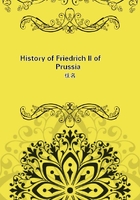
第27章 @@(4)
a violently sensitive man. For example, once in the Bohemian solitudes, on a summer afternoon, in one of his thousand-fold pilgrimings and wayfarings, he had lain down to rest, his one or two monks and he, in some still glade, "with a stone for his pillow" (as was always his custom even in Prag), and had fallen sound asleep. A Bohemian shepherd chanced to pass that way, warbling something on his pipe, as he wended towards looking after his flock. Seeing the sleepers on their stone pillows, the thoughtless Czech mischievously blew louder,--started Adalbert broad awake upon him; who, in the fury of the first moment, shrieked: "Deafness on thee! Man cruel to the human sense of hearing!" or words to that effect. Which curse, like the most of Adalbert's, was punctually fulfilled: the amazed Czech stood deaf as a post, and went about so all his days after; nay, for long centuries (perhaps down to the present time, in remote parts), no Czech blows into his pipe in the woodlands, without certain precautions, and preliminary fuglings of a devotional nature.
[Bollandus, ubi supra.]--From which miracle, as indeed from many other indications, I infer an irritable nervous-system in poor Adalbert; and find this death in the Romova was probably a furious mixture of Earth and Heaven.
At all events, he lies there, beautiful though bloody, "in the form of a crucifix;" zealous Adalbert, the hot spirit of him now at last cold;--and has clapt his mark upon the Heathen country, protesting to the last. This was in the year 997, think the best @@@@@Antiquaries. It happened at a place called FISCHHAUSEN, near Pillau, say they; on that, narrow strip of country which lies between the Baltic aad the Frische Haf (immense Lake, WASH, as we should say, or leakage of shallow water, one of two such, which the Baltic has spilt out of it in that quarter),--near the Fort and Haven of Pillau; where there has been much stir since; where Napoleon, for one thing, had some tough fighting, prior to the Treaty of Tilsit, fifty years ago. The place--or if not this place, then Gnesen in Poland, the final burial-place of Adalbert, which is better known--has ever since had a kind of sacredness;better or worse expressed by mankind: in the form of canonization, endless pilgrimages, rumored miracles, and such like. For shortly afterwards, the neighboring Potentate, Boleslaus Duke of Poland, heart-struck at the event, drew sword on these Heathens, and having (if I remember) gained some victory, bargained to have the Body of Adalbert delivered to him at its weight in gold. Body, all cut in pieces, and nailed to poles, had long ignominiously withered in the wind; perhaps it was now only buried overnight for the nonce? Being dug up, or being cut down, and put into the balance, it weighed--less than was expected. It was as light as gossamer, said pious rumor, Had such an excellent odor too;--and came for a mere nothing of gold! This was Adalbert's first miracle after death; in life he had done many hundreds of them, and has done millions since,--chiefly upon paralytic nervous-systems, and the element of pious rumor;--which any Devil's-Advocate then extant may explain if he can! Kaiser Otto, Wonder of the World, who had known St. Adalbert in life, and much honored him, "made a pilgrimage to his tomb at Gnesen in the year 1000;"--and knelt there, we may believe, with thoughts wondrous enough, great and sad enough.
There is no hope of converting Preussen, then? It will never leave off its dire worship of Satan, then? Say not, Never; that is a weak word. St. Adalbert has stamped his life upon it, in the form of a crucifix, in lasting protest against that.
Chapter III.
MARKGRAVES OF BRANDENBURG.
Meanwhile our first enigmatic set of Markgraves, or Deputy-Markgraves, at Brandenburg, are likewise faring ill. Whoever these valiant steel-gray gentlemen might be (which Dryasdust does not the least know, and only makes you more uncertain the more he pretends to tell), one thing is very evident, they had no peaceable possession of the place, nor for above a hundred years, a constant one on any terms. The Wends were highly disinclined to conversion and obedience: once and again, and still again, they burst up; got temporary hold of Brandenburg, hoping to keep it;and did frightful heterodoxies there. So that to our distressed imagination those poor "Markgraves of Witekind descent," our first set in Brandenburg, become altogether shadowy, intermittent, enigmatic, painfully actual as they once were. Take one instance, omitting others; which happily proves to be the finish of that first shadowy line, and introduces us to a new set very slightly more substantial.
END OF THE FIRST SHADOWY LINE.
In the year 1023, near a century after Henry the Fowler's feat, the Wends bursting up in never-imagined fury, get hold of Brandenburg again,--for the third and, one would fain hope, the last time. The reason was, words spoken by the then Markgraf of Brandenburg, Dietrich or Theodoric, last of the Witekind Markgraves; who hearing that a Cousin of his (Markgraf or Deputy-Markgraf like himself) was about wedding his daughter to "Mistevoi King of the Wends," said too earnestly: "Don't! Will you give your daughter to a dog?" Word "dog" was used, says my authority. [See Michaelis Chur und Furstlichen Hauser,